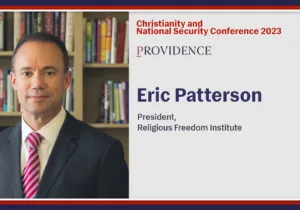This post is taken from Providence’s weekly newsletter, offering fresh thoughts and a round up of recent posts, events, and other topics. For a free subscription, register your email here.
—
On one point, at least, Griffin Jackson in his recent post at relevantmagazine.com and I can agree: “The globalism that created international organizations and cross-border communities like the European Union…faces revived competition in the form of individually-focused nationalism.” This is undoubtedly true. As seen in the rise of Trump in the United States and right-wing political parties across Europe, nationalism, expressed most fundamentally as a desire to reassert national security, sovereignty, and identity against an increasingly rapacious cosmopolitanism, has proved premature easy claims about globalism’s uncontested future.
In response, nationalism—and a cluster of related ideas such as patriotism and jingoism—has become a major point of conversation, rightly (and leftly) so. Christians need to clarify and assert a theologically-grounded view of such things. While it’s an important issue for every citizen, people of faith, particularly those who belong to the great monotheistic faiths, need to have a handle on the nature of their fidelities and duties to God and country. Indeed, from the very beginning Christians have asked what is to be rendered to Caesar and what is to be rendered to God alone. This conversation has been framed by such categories as the two kingdoms, two swords, two cities, and, in our post-Westphalian era most especially, the church and state.
While I agree with Jackson’s opening statement about the challenge that reconstituted nationalism poses to globalism, I’m not as immediately alarmed—or at least not with the same insistence—as he seems to be. Don’t misunderstand. My path to becoming a Christ-follower was routed through a long, and ongoing, study of the holocaust. I am perfectly aware that nationalism can erupt in hate, militarism, and xenophobia. Twentieth-century history proves without question that flag-waving can lead to crematoria fires fed with human fuel. Just as true, nationalism can lead to isolationism, retrenchment, withdrawal, and disregard for the conditions of our international neighbors. Neither kind of nationalism, however antipodal, is a Christian option. Christians are called to love, but in the first kind of nationalism, hatred shoves love violently to the side; in the second, indifference ignores crucial aspects of love completely. But I strongly suspect that these are not the only possible expressions of nationalism.
At the outset of Jackson’s post, the optimistic reader can hope that jackson, too, might offer something more nuanced than a simple blanket condemnation of nationalism. His qualifier “individually-focused nationalism” offers the possibility that he recognizes different species of nationalism and reserves his condemnation for, well, the bad kind. But it seems clear that what might have been a modifier is merely an intensifier. Jackson quotes, approvingly, the songwriter Surfjan Stevens, who in a Tumblr letter gases about God having “no political boundary”, that a “Christian nation” is “absolutely heretical” because “Christ did not come into this world to become a modifier”, and that we all need to abandon “fear-mongering” and to instead pray for our “enemies”. Curiously, the scare-quotes around enemy are Stevens’ own—apparently enemies don’t actually exist, at least not where we think, so borders, we can happily conclude, are unnecessary. Indeed, the Tumblr message seems to insist we throw aside all distinctions between ourselves and others completely. Our identify, Stevens adjures, must not be found in “skin color, nation, ideology, genealogy, name, people, places and things” but rather in the “brotherhood and sisterhood of all humanity.” The sentiment is not–were it were so!–limited to songwriters. Last year, EU chief Jean-Claud Junckers complained that political borders are “the worst invention ever” and that Brexiters were unpatriotic because they stood for England against Europe.
Among much else, this is simply insufficient. Talk about a brother- or sisterhood of all humanity seems a vacuous abstraction. To belong anywhere we first have to belong somewhere—somewhere concrete, immediate, palpable. As Edmund Burke famously wrote in Reflections on the Revolution in France:
To be attached to the subdivision, to love the little platoon we belong to in society, is the first principle (the germ as it were) of public affections. It is the first link in the series by which we proceed towards a love to our country, and to mankind.
Burke is reminding us that you cannot begin with the abstraction; nation-states have a vital role to play. Indeed, before even the subdivision, one must rightly render fidelity to their block, their street, and on down finally to their family. Prior to the family is the individual. Christians have made a hash of rightly understanding self-love. True, like nationalism, human beings have done terrible things in the name of self-love. But abuse, we know, does not invalidate proper use. As C.S. Lewis reminded us, in Christ we were called to be members of one sheep-fold and not drops in one puddle. Individuality matters. There is a bright line between the Christian tendency to discount the value of the self and to discount the value of the nation. Humility is not thinking low of yourself, it’s not even trying to avoid thinking about yourself at all. Rather, humility is thinking properly about yourself.
Of course, our fidelity to our individual lives, our families, our blocks, and our little platoons radiates outwards along a vast trajectory—or ought to. Individuality ought not simply to be a blessing to ourselves, but to others as well. As Rich Lowry and Ramesh Ponnoru suggest in an important recent essay arguing for the good of nationalism:
People aren’t just atomistic individuals bouncing around in a free market; they are members of communities with attachments to faith, family, and civic associations that give their lives meaning. The nation is a community writ large, and it is natural for people to love it—to revere its civic rituals, history, landscape, music, art, literature, heroes, and war dead.
The essay has resulted in numerous responses (here, here, and here, among them). One of the common rejoinders is that whatever good work nationalism might do is already captured by patriotism—and so we should fall back to familiar juxtapositions between the two. Jackson advocates as much when he writes, “patriotism, as a general love or devotion to one’s country, is much simpler than nationalism.” He continues:
The distinction is important, especially for followers of Jesus. Nationalism asks you to put your country’s interests above all others. Patriotism asks me to love my country but not at the expense of any other.
Well, if this is the definition of patriotism, which I’m doubtful that it is, then I agree with Jackson that it is simple. But then there are at least two problems. The first problem is that Jackson never makes clear why simple in this case is necessarily better than complex. If you water down necessary complexity, you do not render it simple but rather simplistic. Facile, eviscerated truth is just as misleading as embellished truth. Some subjects are minefields, there’s no straight-forward, simple way through. Safe passage is plodding, careful, and nuanced, and progress is often marked by both moving forward and retreating.
The second problem is that at the very least such a definition of patriotism is impotent and can’t do any work, and at worst it is unbiblical. Why? Because one ought not, indeed really cannot, love in a “general” way. One does not devote oneself to anything, certainly not one’s nation, simply in this or that way. To love as God loves means to love what is worthy of love or to not love it at all. When it comes to love of one’s country, the founding ideals, history, character, and civil institutions need to frame our consideration. Jackson continually insists that “we must not elevate the distinction of national, ethnic or cultural identity over our higher identities as disciples of Christ and as human beings.” But this misses the point and makes a category error. Nationalism, American nationalism in this case, need not be the indiscriminate elevation of “American” over Canadians, Belgians, Darfurians, or anybody else. But because we do not love in general ways, American nationalism may well be a fidelity not just to the country, but to the people of that country who are bound together in voluntary fidelity to a certain way of doing life together–to the love of certain, specific things.
In the American context, at least, this is not simply some free association within a social contract. In its grounding–that’s to say in our founding–it is the recognition of certain inalienable rights found in the law of nature and in nature’s God. These rights include created equality, life, the cardinal freedoms of expression, thought, and worship, and the pursuit of happiness as human flourishing. These are goods worthy of elevating over lesser goods and in being pursuing should they be found absent. Some nations, in their founding ideals or in some dark period of its history, will be found morally wanting—and others so grievously morally wanting—that even Jackson’s gauzy understanding of patriotism must be withheld, if only until moral restoration is achieved. So the retreat to patriotism is not as simple an alternative as it first appeared. It avoids the conceptual difficulties of nationalism only by hiding in the simplistic.
Identifying the means to make such judgments about when and how to love one’s country and, indeed, how to discriminate between patriotism and nationalism is going to be an ongoing project—and we’ve not even broached the idea of “jingoism”. I am not entirely sure about the Church of England’s Remembrance Day hymn that goes: “I vow to thee, my country…the service of my love/ the love that asks no questions, the love that stands the test/ that lays upon the altar, the dearest and the best.” While the hymn’s second verse gives assurance that the song does not divinize the nation, surely love–as I’ve unpacked it above–always questions. It must not be “my country right or wrong.” Knowing what I know of them, I hope I would not have sacrificed my life for Nazis Germany or apartheid South Africa, but I also recognize that in both cases I would quite likely have had a strong impulse to defend my national neighbors behind me and to either side from those foreign neighbors arrayed in front of me. I hope to sort all this out–and welcome the help in doing so. My starting assumption is that the three terms–patriotism, nationalism, and jingoism–are each important for more than just semantic reasons, and that none of the terms is simply a synonym for one of the others. Specifically, I jingoism is never to be embraced and ought to be expulsed from the national consciousness. But I also suspect there is good to be found in nationalism that is not quite captured in patriotism, but also that patriotism might somehow focus, orient, and limit nationalism. I’m not sure either is immediately to be lauded nor immediately to be condemned.
I might be wrong. But the matter will certainly not be decided by simplistic ideas about national devotion giving way to a citizenship of the world.







 Sponsor a student for Christianity & National Security 2024
Sponsor a student for Christianity & National Security 2024